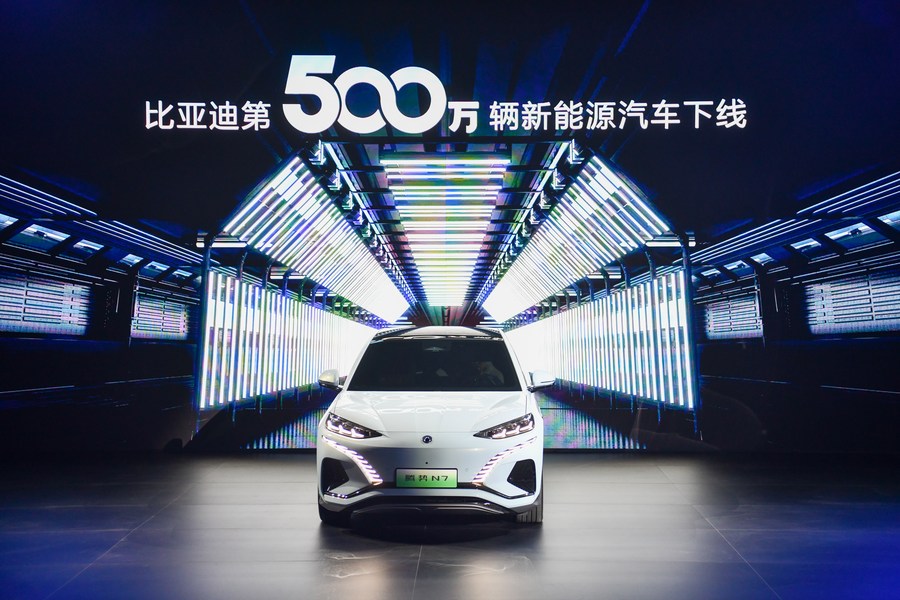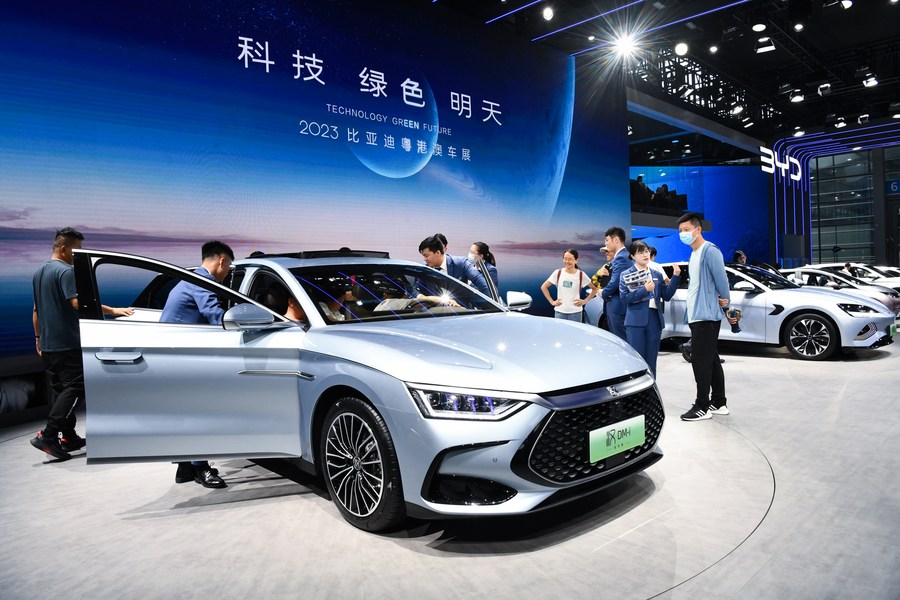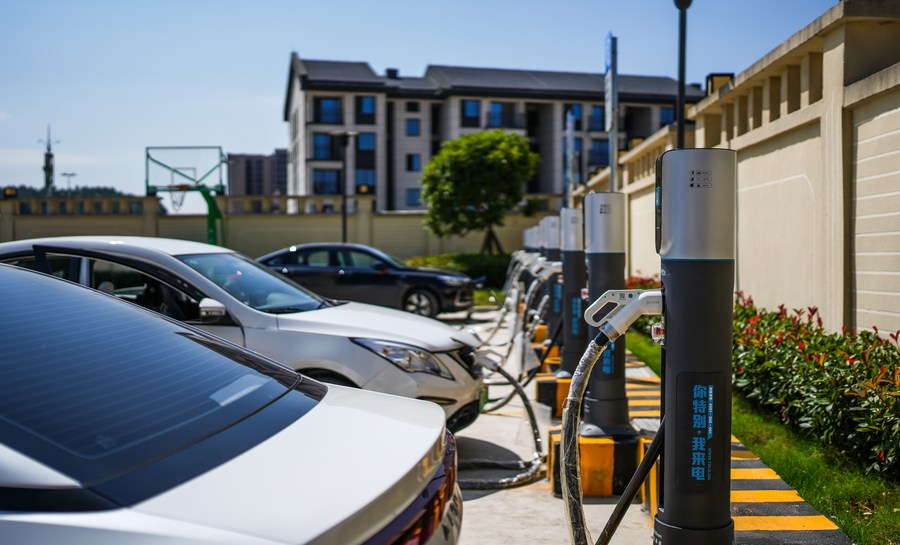* Chinese NEV maker BYD outpaced Tesla in its quarterly sales of pure electric vehicles for the first time.
* The Shenzhen-based company is already the world's top NEV seller, if calculating annual sales of both pure electric cars and plug-in hybrid ones.
* BYD is one of the many NEV producers that have seen booming sales as China, the world's largest auto market, transitions toward greener technologies.

The five millionth new energy vehicle produced by Chinese carmaker BYD rolls off production line in Shenzhen, south China's Guangdong Province, Aug. 9, 2023. (Xinhua/Liang Xu)
SHENZHEN, Jan. 4 (Xinhua) -- China's BYD became the world's leading seller of pure electric vehicles in the fourth quarter of 2023, marking another landmark moment in China's fast-growing new energy vehicle (NEV) sector.
The Shenzhen-based auto company announced the sales of 526,409 all-electric cars between October and December, surpassing Tesla's 484,507 in the same period.
The annual figures also saw BYD retaining the title of the world's top NEV seller, with more than 3.02 million cars sold last year, including both pure electric models and plug-in hybrid ones.
BYD is one of the many NEV producers that have seen booming sales as China, boasting the largest number of motor vehicles in the world, transitions toward greener technologies.
Among Chinese companies, GAC Aion, an NEV subsidiary of GAC Group, saw its sales increase by 77 percent to reach 480,000 last year. NEV startup Li Auto delivered 376,000 vehicles in 2023, marking a 182.2-percent rise.
The U.S. NEV giant Tesla also celebrated a 38-percent growth in car delivery in 2023. With a gigafactory in Shanghai, the company considers China its largest overseas market outside the United States.

Visitors learn about new energy vehicles of Chinese carmaker BYD during the 27th Guangdong-Hong Kong-Macao Greater Bay Area International Auto Show at the Shenzhen Convention and Exhibition Center in Shenzhen, south China's Guangdong Province, June 16, 2023. (Xinhua/Liang Xu)
WHY BYD?
Established in 1995 as a battery producer, BYD was an early starter in the pursuit of NEV manufacturing in China. In 2004, when BYD's new energy cars made their debut at Beijing's international auto show, the company was the only carmaker there to exhibit NEVs.
"When we first announced our electric vehicle production plan, not many people had confidence in us," recalled Wang Chuanfu, chairman of BYD.
"But we had confidence in our prediction that the traditional auto market would have a market size ceiling due to environmental and climate change factors," Wang said.
After tiding over a rocky start characterized by consumer suspicions over driving range and scarce charging facilities involving NEVs, the company ushered in an era of robust growth in recent years.
Last year, the company sold more than 1.57 million pure electric passenger cars, representing a 72.8 percent rise year on year. Its sales of plug-in hybrid vehicles also climbed 52 percent to exceed 1.43 million.
Its bestselling models target the mid-range market and young consumers. In China, BYD models rank first in price ranges of 100,000 to 150,000 yuan (about 14,000 to 21,400 U.S. dollars) and 150,000 to 200,000 yuan, according to a report by SDIC Securities.
Industry observers say Chinese NEV companies such as BYD have incorporated attractive designs and smart technologies to appeal to Chinese consumers aged between 20 and 40, who have become the primary customers of NEVs.
On the manufacturing end, BYD has benefited from the mature NEV industry chain in the city of Shenzhen, ranging from battery packs and intelligent cockpits to charging piles. The southern tech hub also boasts many internet and artificial intelligence companies that are making inroads into the intelligent driving sector, said Yu Xiquan, head of the city's bureau of industry and information.

This photo taken on Oct. 17, 2023 shows new energy vehicles being charged at a charging area in Gujiao Township of Qiannan Bouyei and Miao Autonomous Prefecture, southwest China's Guizhou Province. (Xinhua/Tao Liang)
WHY CHINESE COMPANY?
As the world's largest producer and market of NEVs, China had more than 18 million NEVs in use as of September last year, accounting for more than half of the world's total. This vast and burgeoning domestic market, coupled with the government's push for low-carbon development, is believed to have pushed Chinese NEV companies to the global forefront of innovation.
In a prior landmark event for the industry, longstanding German carmaker Volkswagen Group in July reached an agreement to buy a 4.99 percent stake in the Chinese electric vehicle startup Xpeng and co-develop two NEV models for the Chinese market.
The deal attracted much attention as it gave Volkswagen access to Xpeng's technologies, including the advanced driving assistance system (ADAS), breaking the mold of one-way technological transfer from foreign auto firms to Chinese ones.
To spur the market transition, the Chinese government has rolled out a range of policy incentives in recent years to promote research, pilot new NEV applications and construct more charging facilities, especially in the vast countryside.
According to the coalition on the promotion of electric vehicle charging infrastructure, the number of charging facilities in China increased by 67 percent in the first 11 months of 2023, offering a strong impetus to the sector's fast growth in 2023.
The thriving NEV sector has now placed China in a better position to realize the country's dual carbon goals of peaking carbon dioxide emissions by 2030 and achieve carbon neutrality by 2060.
Automobile is a major source of carbon dioxide emissions, so the promotion of new energy and emission reduction in the sector is a direct and effective approach to tackling climate change, the BYD chairman said.





